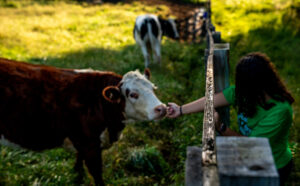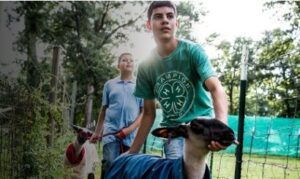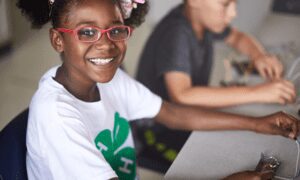We continue celebrating and highlighting 4‑H Mentoring programs across the country, and the mentors who have changed the lives of youth in their communities by serving as role models, educators, life coaches and friends. In our final installment, we’re featuring the 4‑H Tech Wizards Mentoring Program at the University of Vermont.
4‑H Tech Wizards is an after-school and in-school, youth mentoring program for underserved youth grades 4-12, that sparks youth interest in science, technology, engineering, and math (STEM) fields. Tech Wizards adult mentors are selected based on their experience in STEM fields and they teach kids about science and technology through project-based learning.
We chatted with Deborah Fajans, site coordinator and mentor in Westminster, Vermont, who shared her thoughts on the power of mentoring in the Tech Wizards program.
What is the main focus area of the program? What are its goals?
Deborah Fajans (DF): Tech Wizards is really a mentoring program, but we use science and technology as the hook to get culturally diverse, economically and physically at-risk children into our mentoring programs. Our main goal is to guide these children through tough times and making good choices for personal growth. During the science and engineering aspect of it, [the goals are] to develop skills, set a career path, and build self-esteem. It’s a great situation because they don’t know they’re being mentored, they don’t know that they are learning these science skills; it all happens in the context of fun.
What areas do you focus on most when mentoring a young person? Academics, career path, personal growth, etc.?
DF: My site is a residential school for children who are at-risk and cannot stay at home or are removed from the home. These children generally are confused or have low self-esteem, so the mentoring aspect of Tech Wizards is our number one priority. We also mentor in the context of science and engineering so academics is the next part. Tech Wizards is fused in every aspect of the school.
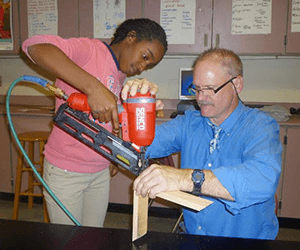
Today, in many cases, youth development organizations have become the main source of mentorship and learning for young people, other than school learning. What does it take for families to become actively involved in a child’s upbringing, both during and after school?
DF: It is my belief that every family, parent or guardian is trying to do the best they can. I think families need training, meaningful ways to engage in their children’s experiences. I think the Tech Wizards program is right there, front and center, to provide that training. We may create activities for families to engage with their children, and we have family strengthening programs to help better mentor and nourish children. Tech Wizards’ training is culturally sensitive and responsive to what parents can and cannot give and we try to step in and train families to meet those needs for the children.
Share with us your most rewarding experience(s) as a mentor.
DF: On a personal level, I know that I’ve made a connection when I walk into a school and the faces light up. I also know when I’m making a connection when they come to me with their problems. I have learned to be totally receptive, to drop everything that I can and really listen. I can feel the connection because they have 100% of me, and I like that feeling.
I have a number of children that have gone on from the Tech Wizards program to use the science skills that they have learned and have set a career path for themselves.
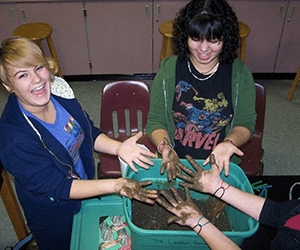
As a mentor, do you feel it is important to familiarize yourself with your mentee’s family/friends?
DF: I think it’s especially important, because many of the children at my site have been removed from their family. We have to work really hard to keep that connection going. We have Family Day, and I work really hard on those days. The school works very hard, and the child psychologists, to keep the mentors aware. I think many programs fail at these things because they have to flesh these issues out on their own. We train families to be better support systems, so it’s important to know the families.
Were you mentored as a young person? If so, who was your mentor and how did that person make a positive impact on your life?
DF: Well, I think everybody finds mentors along the way. Living one’s life – a child, even an adult – they need a roadmap. They may lose their way or they are in unfamiliar situations that there is always a need for a helpful friend or mentor to guide you through that. As a child, I can think of my high school English teacher [as a mentor]. I grew up in a small town and he encouraged us to be brave, to think about the bigger world, the bigger picture, and have the courage to go for it. I was mentored in my first job by a female supervisor who was vested in seeing young women make it up through the ranks. I’m even being mentored now by a university faculty member and Tech Wizards colleague who has been my guide for 14 years, helping me to achieve professionally. I owe a lot to that person.
In what ways do you think someone, at any age, can benefit from having a mentor?
DF: My philosophy is that mentors are everywhere, and they are needed often, in all stages of life. I think mentors can be a roadmap through life. You can’t know it all and solve all your problems by yourself. It takes a village to raise a child, and many mentors to get through life.
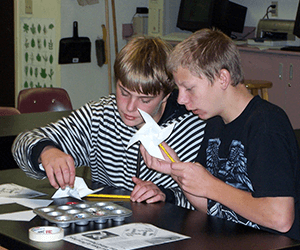
In what ways do you think someone, at any age, can benefit from having a mentor?
DF: My philosophy is that mentors are everywhere, and they are needed often, in all stages of life. I think mentors can be a roadmap through life. You can’t know it all and solve all your problems by yourself. It takes a village to raise a child, and many mentors to get through life.
Do you think there should be a level of emotional preparedness?
DF: The Tech Wizards program has training for mentors. We have orientation sessions where we talk about ages and stages, where we train mentors on what to expect at different stages. A 7-year-old is going to look at a situation differently than a 13-year-old. We train a lot on the possible things that could happen.
What advice would you give someone interested in becoming a mentor?
DF: Well, I think they need to know that it is a very changeable journey. You can approach the mentorship thinking that you have these goals to achieve with your mentee but life kind of gets in the way, or changes it up. You need to be flexible. There are certain circumstances that may arise and you need to be there. You entered into this arrangement with this child that requires you to be focused and responsive. There may be instances where the mentee is calling the mentor for help, asking them to be there. If you don’t arrive, come early, or you don’t stay late during that time, you may miss some important signs and signals. That requires flexibility and learning on the mentor’s part.









